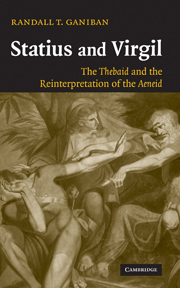Book contents
- Frontmatter
- Contents
- Preface
- List of abbreviations
- 1 Introduction
- 2 Oedipus' curse
- 3 Horror, prophecy, and the gods
- 4 Hypsipyle's narrative of nefas
- 5 Bacchus and the outbreak of war
- 6 Dis and the domination of hell
- 7 Delay and the rout of Pietas
- 8 Spectacle, crime, and monarchy at Thebes
- 9 Pietas, burial, and clementia in a world of nefas
- Works cited
- General index
- Index locorum
6 - Dis and the domination of hell
Published online by Cambridge University Press: 22 September 2009
- Frontmatter
- Contents
- Preface
- List of abbreviations
- 1 Introduction
- 2 Oedipus' curse
- 3 Horror, prophecy, and the gods
- 4 Hypsipyle's narrative of nefas
- 5 Bacchus and the outbreak of war
- 6 Dis and the domination of hell
- 7 Delay and the rout of Pietas
- 8 Spectacle, crime, and monarchy at Thebes
- 9 Pietas, burial, and clementia in a world of nefas
- Works cited
- General index
- Index locorum
Summary
Soon after the Theban war starts, a strange event occurs. As the Argive seer Amphiaraus is raging on the battlefield, the earth gapes open and swallows him, chariot and all. Amphiaraus' plunge into hell not only marks the first day of fighting but also initiates a new stage in the involvement of the infernal powers in the Theban war, a development with significant implications for the Thebaid's dialogue with the Aeneid. Augustan ideology is centrally concerned with control and order, the mastering of the destructive forces of the passions that bring about political and cosmic strife and that are represented in Virgil's epic especially by Juno and the Furies. But the reality of the Thebaid is that such control is elusive. As we saw in chapter 5, Jupiter and the heavenly gods, despite (or perhaps because of) their appropriation of Virgilian models, are subject to the passions and to the intertextual power of Juno and hell. They ultimately fail to understand the war, the world, and the problematic nature of their own actions.
Philip Hardie has shown well the significance both of the cosmic outlook in the Aeneid for the poem's Augustan ideology and of the growing divide between heaven and hell, begun in the Aeneid, but expanded in its successors. When turning to Statius' Thebaid, however, he is less concerned with the political aspect of these ideas, though it is also important.
- Type
- Chapter
- Information
- Statius and VirgilThe Thebaid and the Reinterpretation of the Aeneid, pp. 117 - 151Publisher: Cambridge University PressPrint publication year: 2007



